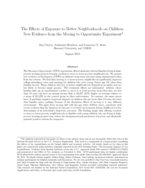Found 26 resources.
0
0
0
Child poverty is an urgent and preventable crisis. Solutions to child poverty already exist if we just expand and invest in them. Benefits like nutrition assistance, housing vouchers and tax credits helped lift nearly 7 million children out of poverty in 2017, but millions of children were left behind due to inadequate funding, eligibility restrictions and low wages. We can and must fix these problems to help more children escape poverty now.
Topics: Child welfare, Dual-generation, Early childhood, Food insecurity, Funding, Housing, Legislation & Policy, Low-income, Research, Workforce development
 Shared by Housing Is
on May 28, 2019
Shared by Housing Is
on May 28, 2019 0
0
0
Released bi-monthly, each issue of the ZERO TO THREE Journal focuses on a critical topic within the early childhood development field. Journal articles are carefully composed to present current knowledge, latest research, and practical advice to help early childhood professionals do their best work in support of infants and toddlers.
Topics: Child welfare, Dual-generation, Early childhood, Homelessness, Housing, Low-income, Research, Safety
0
0
0
Democrats this week announced new legislation that would slash child poverty by paying low-income parents the kind of monthly allowance that is standard in other developed countries. But the lawmakers who introduced the bill, called the American Family Act, didn’t use the terms “child benefit” or “child allowance” at their Capitol Hill press conference Wednesday. Instead, they all called it a tax credit or a tax cut.
Topics: Child welfare, Dual-generation, Early childhood, Funding, Legislation & Policy, Low-income, Research
 Shared by Housing Is
on Mar 12, 2019
Shared by Housing Is
on Mar 12, 2019 0
0
0
The strengths and abilities children develop from infancy through adolescence are crucial for their physical, emotional, and cognitive growth, which in turn help them to achieve success in school and to become responsible, economically self-sufficient, and healthy adults. Capable, responsible, and healthy adults are clearly the foundation of a well-functioning and prosperous society, yet America’s future is not as secure as it could be because millions of American children live in families with incomes below the poverty line. A wealth of evidence suggests that a lack of adequate economic...
Topics: Child welfare, Dual-generation, Legislation & Policy, Low-income, Research
 Shared by Housing Is
on Mar 1, 2019
Shared by Housing Is
on Mar 1, 2019 0
0
0

For a very young child, the relationship with a primary caregiver, most often though not exclusively a mother, lays an important psychological foundation for later flourishing. Successful attachment and bonding in the first two years of life predicts healthy later development on a range of fronts, from mental health to educational skills. When bonding and attachment prove difficult, child development is affected. Recent advances in brain science allow this impact to be shown more clearly and more definitively.
Topics: Child welfare, Depression, Dual-generation, Early childhood, Health, Low-income, Mental health, Mobility
0
0
0
Times are changing rapidly for families—our households, work and the workforce do not look like they did just a decade ago. Challenges and barriers for parents continue to grow – skyrocketing costs of health care and child care, lack of flexibility at the workplace, and less time at home. Working parents have to balance their budget and time across an ever-changing landscape of needs: from caring for themselves, their children, and older family members, to affording quality child care and paying household bills. Removing barriers so families can care for their loved ones requires us to...
Topics: Child welfare, Dual-generation, Early childhood, Family engagement, Health, Legislation & Policy, Low-income, Preventative care
0
0
0

A D.C. housing development serves as a refuge for grandparents raising young children. Is it a model for the rest of the country?
Topics: Child welfare, Dual-generation, East Coast, Family engagement, Low-income, Place-based, Seniors, Stability, Youth
0
0
0
Stricter work requirement policies for the Supplemental Nutrition Assistance Program (SNAP) at the federal level were left out of the recently passed farm bill, but state policymakers are still considering whether to expand or establish their own work requirements for SNAP and Medicaid, with the goal of incentivizing employment. There’s no question that good jobs help spur upward mobility. But if we are serious about helping people work, we have to get serious about helping people improve their skills.
Topics: Child welfare, Cost effectiveness, Dual-generation, Early childhood, Food insecurity, Legislation & Policy, Low-income, Research, Stability, Workforce development
0
0
0
The Colorado Division of Youth Services is working to transform the family experience by taking a two-generation (2Gen) approach to the services it provides.
Topics: Child welfare, Dual-generation, Early childhood, Family engagement, Low-income, Partnerships, Stability
0
0
0

Many low-income families in the United States face challenges associated with unemployment, health, and education disparities. To help overcome these challenges, several federal programs aim to assist these families with employment, self-sufficiency, healthy relationships, and individual well-being. Understanding the effects of these programs, including whether they meet the needs of those they intend to serve, requires a strong partner. Mathematica’s team of seasoned experts has worked closely with the Administration for Children and Families (ACF), Office of Planning, Research, and...
Topics: Asset building, Child welfare, Dual-generation, Family engagement, Low-income, Research, Stability
0
0
0

On Wednesday, October 24, President Trump signed into law bipartisan legislation, H.R. 6, the SUPPORT for Patients and Communities Act. This sweeping legislation contains many provisions that could help children, youth, and families experiencing homelessness who are impacted by the opioid crisis, as well as provisions to help all children and youth who experience trauma.
Topics: Child welfare, Dual-generation, Early childhood, Family engagement, Housing, Legislation & Policy, Low-income, Substance abuse, Supportive housing
0
0
0

Current efforts to end homelessness are largely focused on the immediate housing needs of adults. Yet recent research further demonstrates the importance of addressing childhood, early care, and education in efforts to prevent and end homelessness. This blog post summarizes five new studies. Topics include homelessness in the womb and during infancy; the Adverse Childhood Experiences of homeless adults; the employment of families during and after stays in homeless shelters; and the impact of Rapid Rehousing on the education of children and youth experiencing homelessness.
Topics: Child welfare, Dual-generation, Early childhood, Education, Health, Homelessness, Housing, Low-income, Pre-natal, Research
0
0
0
This brief highlights evidence on nutrition supports for families with young children and proposes a policy-focused research agenda designed to address knowledge gaps in two areas: (1) understanding disparities in participation in nutrition supports and (2) assessing strategies to increase access to nutrition supports and reduce nutrition disparities.
Topics: Child welfare, Dual-generation, Early childhood, Food insecurity, Low-income, Nutrition, Research
0
0
0
Research shows that the earliest years of life are a critical period of human development. Young children’s earliest relationships and experiences have a strong influence on brain development and future health and well-being. Young children’s foundational relationships and experiences occur in the context of families and communities. Yet, low-income families—especially families of color and rural families—often do not have access to the basic necessities and resources to foster the nurturing experiences and stimulating environments that young children need to thrive. What is needed are...
Topics: Child welfare, Dual-generation, Early childhood, Low-income, Research
0
0
0
Which neighborhoods in America offer children the best chance to rise out of poverty? The Opportunity Atlas answers this question using anonymous data following 20 million Americans from childhood to their mid-30s. Now you can trace the roots of today's affluence and poverty back to the neighborhoods where people grew up. See where and for whom opportunity has been missing, and develop local solutions to help more children rise out of poverty.
Topics: Asset building, Child welfare, Dual-generation, Early childhood, Education, Health, Housing, Low-income, Mobility, Stability, Youth
 Shared by Housing Is
on Oct 12, 2018
Shared by Housing Is
on Oct 12, 2018 0
0
0
Homelessness among children is correlated with developmental delays, fair or poor health, and high healthcare utilization. Associations of homelessness specifically among infants younger than 12 months, however, are unknown. This study evaluates homelessness during infancy as a risk for adverse infant and maternal health and hardship.
Topics: Child welfare, Depression, Disabilities, Dual-generation, Early childhood, Education, Family engagement, Food insecurity, Grade-level proficiency, Health, Homelessness, Housing, Low-income, Metrics, Partnerships, Pre-natal, Research, School-readiness, Youth
 Shared by Housing Is
on Aug 1, 2018
Shared by Housing Is
on Aug 1, 2018 0
0
0
The Moving to Opportunity (MTO) experiment offered randomly selected families living in highpoverty housing projects housing vouchers to move to lower-poverty neighborhoods. We present new evidence on the impacts of MTO on children’s long-term outcomes using administrative data from tax returns. We find that moving to a lower-poverty neighborhood significantly improves college attendance rates and earnings for children who were young (below age 13) when their families moved. These children also live in better neighborhoods themselves as adults and are less likely to become single parents. The...
Topics: Child welfare, Cost effectiveness, Dual-generation, Education, Housing, Low-income, Mobility, Research
 Shared by Housing Is
on Jul 23, 2018
Shared by Housing Is
on Jul 23, 2018 0
0
0
The South Lincoln Health Impact Assessment (HIA) focuses on the redevelopment master plan for the Denver Housing Authority’s South Lincoln Homes community in downtown Denver. The rapid HIA and masterplan was a four-month process that began in April 2009. The HIA identifies potential health impacts and recommends changes to optimize positive and minimize negative health consequences for the South Lincoln neighborhood. This assessment includes community demographic and socioeconomic information, identified potential health issues, interviews available surveys, and limited body measurement data...
Topics: Child welfare, Community development, Disabilities, Dual-generation, Health, Housing, Low-income, Mental health, Metrics, Nutrition, Preventative care, Research, Safety
 Shared by Housing Is
on Jul 17, 2018
Shared by Housing Is
on Jul 17, 2018 0
0
0
The Trauma Informed Community Building (TICB) model is based on BRIDGE Housing Corporation’s experience doing community building work over the past five years in the Potrero Terrace and Annex public housing sites in San Francisco, CA.
Topics: Child welfare, Community development, Dual-generation, Family engagement, Low-income, Mental health, Partnerships, Place-based, Preventative care, Research, Safety
 Shared by Housing Is
on Jul 12, 2018
Shared by Housing Is
on Jul 12, 2018 0
0
0
We examined the influence of maternal health literacy on child participation in social welfare programs. In this cohort, 20% of the mothers had inadequate or marginal health literacy. Initially, more than 50% of the families participated in Temporary Assistance for Needy Families (TANF), the Food Stamp Program, and Special Supplemental Nutrition Program for Women, Infants, and Children, whereas fewer than 15% received child care subsidies or public housing. In multivariate regression, TANF participation was more than twice as common among children whose mothers had adequate health literacy...
Topics: Child welfare, Dual-generation, Early childhood, Education, Family engagement, Food insecurity, Health, Housing, Low-income, Medicaid / Medicare, Nutrition, Pre-natal, Preventative care, Research, Stability
 Shared by Housing Is
on Jul 12, 2018
Shared by Housing Is
on Jul 12, 2018 0
0
0
In Boston, Massachusetts, the Boston Housing Authority, Boston Public Health Commission, the city’s Inspectional Services Department, the Boston Foundation, and local universities and medical institutions have come together over the last decade-plus to address the intersection of health and housing. Motivated by a desire to improve the lives of Boston’s most vulnerable residents, these organizations began collaborating to address asthma and, more recently, to prioritize housing and health needs for pregnant women. By bridging anchor institutions, foundations, and city agencies around health...
Topics: Asthma, Child welfare, Dual-generation, Early childhood, East Coast, Exercise, Family engagement, Funding, Health, Home visiting, Homelessness, Housing, Low-income, Medicaid / Medicare, Nutrition, Obesity, Partnerships, Pre-natal, Preventative care, Research, Smoke-free
 Shared by Housing Is
on Jul 12, 2018
Shared by Housing Is
on Jul 12, 2018 0
0
0
In December 2016, federal and state policymakers examined the intersection of unstable housing and negative health outcomes at a meeting convened in Washington, D.C., by the National Academy for State Health Policy (NASHP) with support from The Commonwealth Fund. The goal of the meeting was to identify concrete policy recommendations and actionable steps to align health and housing programs to ensure that people with high service needs receive the housing and supportive services they need to become and stay healthy. This report summarizes their findings and recommendations.
Topics: Child welfare, Cost effectiveness, Data sharing, Disabilities, Dual-generation, Health, Homelessness, Housing, Legislation & Policy, Low-income, Medicaid / Medicare, Partnerships, Seniors, Supportive housing
 Shared by Housing Is
on Jul 10, 2018
Shared by Housing Is
on Jul 10, 2018 0
0
0
Education leaders reconvened on Tuesday to continue discussing how to help kids by helping their parents. The approach, known as the “Two-Gen” method is based on data showing a child’s trajectory is largely determined by their parents’ stability.
Topics: Child welfare, Dual-generation, Education, Family engagement, Literacy, Low-income, School-readiness, Workforce development, Youth
 Shared by Housing Is
on Jul 5, 2018
Shared by Housing Is
on Jul 5, 2018 0
0
0

Poor children don't struggle in school because of their parents. They struggle because of poverty.
Topics: Attendance, Child welfare, Dual-generation, Early childhood, Education, Family engagement, Food insecurity, Grade-level proficiency, Housing, Legislation & Policy, Literacy, Low-income, Out-of-school time, Post-secondary, Racial inequalities, Research, School-readiness, Youth
0
0
0

Why do some neighborhoods appear able to launch effective local improvement initiatives, while others are more hampered by fragmentation and mistrust? Why can some communities mobilize diverse constituencies to influence public policy, while others cannot? Answers to these questions may be found in the specific patterns of collaboration that form among community organizations, and between these groups, schools, public agencies, and elected officials, according to MDRC, a preeminent social-policy research organization.
Topics: Asset building, Child welfare, Community development, Data sharing, Dual-generation, Education, Family engagement, Funding, Health, Housing, Legislation & Policy, Low-income, Metrics, Midwest, Mobility, Out-of-school time, Partnerships, Place-based, Preventative care, Research, Safety, Stability, Workforce development, Youth







